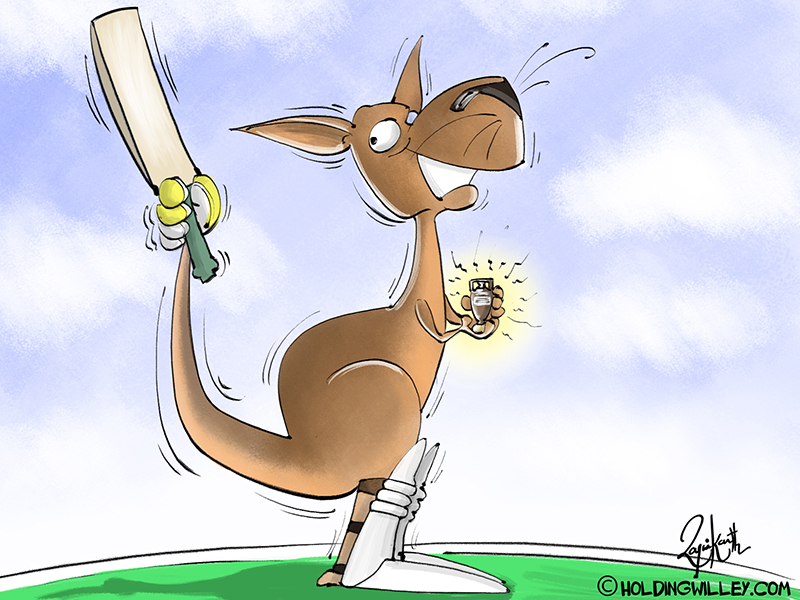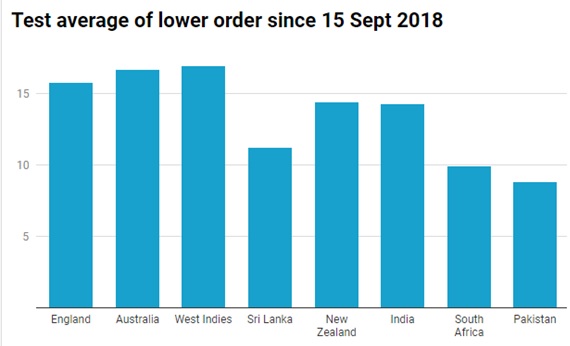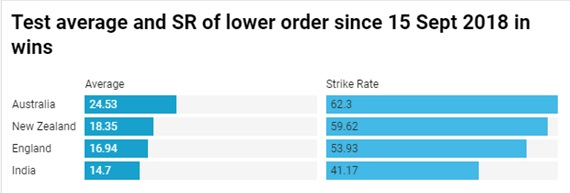 Australia retained the Ashes urn, drawing the series 2-2 with England. Though the feat was majorly attributed to Steven Smith’s superhuman efforts, the Aussie tail played a small yet vital part as well. England’s inability to dismiss the Aussie batters 8 to 11 on a regular basis in the five Tests played a significant part in the final result.
Australia retained the Ashes urn, drawing the series 2-2 with England. Though the feat was majorly attributed to Steven Smith’s superhuman efforts, the Aussie tail played a small yet vital part as well. England’s inability to dismiss the Aussie batters 8 to 11 on a regular basis in the five Tests played a significant part in the final result.
In England this summer, the visitor’s numbers 8 to 12 (Marnus Labuschagne was a concussion replacement in the second game after Smith had walked off, and, hence, 12 players effectively played that game for Australia) managed 370 runs in five games at an average of 19.47. Five players batting at that position crossed the 50-run tally in the series, Peter Siddle leading the way for the Aussies with 84 runs in 3 games at an average of 28.
In the very first innings of the first Test at Birmingham, the hosts had reduced Tim Paine’s side to 122 for 8, with none of the top-order batters getting to double digits, apart from Smith and Travis Head. However, Siddle hung in there for 85 deliveries, scoring 45 runs, which allowed Smith at the other end to accelerate and get the score near 300. In the process, he also got his first Test hundred after his one year ban. In the next innings too, the Aussie tail wagged, with James Pattinson and Pat Cummins getting together to take the target from 409 for 7 to 487 for 7 declared.
In the next four games as well, Australia were aided with vital help from their tail, as they added 1 and 38 at Lord’s, 39 and 4 at Leeds, 84 and 3 at Manchester and another 44 and 23 in the last game at The Oval.
The lower-order from Down Under didn’t fare well just in the Ashes; they have made a habit of pitching in with regular runs in the last twelve months, including in the series against India held late last year. At Perth, the Aussie tail-enders Nathan Lyon, Pat Cummins, Mitchell Starc and Josh Hazlewood, stood tall to contribute 71 runs whilst facing 150 deliveries, and in the following match scored 155 between them across two innings to increase the pressure on the Indian bowlers. All in all, numbers 8 to 11 from Australia on that tour managed an impressive 414 runs in four games at an average of just less than 20.

In the table above, the average of the lower order is taken from those batting below number 8.
If we dissect the numbers further, it is revealed that the Australian tail has contributed runs at an average of 24.53 in wins - the most among teams who have won at least four games in this period. What also stands out is their strike rate, which is more than what the lower orders from other teams have managed in wins.

However, Australian bowlers placing a high price on their wickets is not a current trend. Their tail has averaged 15.71 since the first game was played in 1877. In the last ten years, this average has shot up to 17.16, with the likes of Nathan Hauritz, Pattinson, John Hastings, Mitchell Johnson and Ben Hilfenhaus holding their end up to pile on as many runs as possible. In fact, they have twelve tailenders averaging more than 18 with the willow in the last ten years - the most of any country.
From August 2015 to August 2017, however, the lower order from Australia failed to score runs, as they ranked eight out of ten in the list of most Test runs from batters 8-11. In this two-year period, the Aussies scored 1,070 runs in 22 Tests, averaging just 13.71, and only Lyon and Starc scored more than 200 runs each.
The fast bowler was aggressive in his approach, as he scored 478 runs at an average of 23. Hitting 42 fours and 23 sixes in the two-year period, Starc’s ability and intent to take on the opponents worked in his favour, even as the other lower order batsman from Australia failed to get going. Siddle hit the next most sixes by batters from 8 to 11 in this duration - 4.
However, since then, the average has considerably shot up for the Aussie tail-enders with the bat, and they now average close to 19 with the bat in 2019. So, what has changed in this time?
Playing with an attacking mind-set along with a sense of fearlessness has enabled the Aussies to come good lower down the order. In the last year alone, the Kangaroos have hit 87 fours and 31 sixes in 13 games - a huge jump from the boundaries they hit from 2015 to 2017 - thus, not only frustrating the rival bowlers but also helping add very crucial runs to the team total as the innings nears its end.
The trio of Starc, Cummins and Lyon have led the pack, with 235, 234 and 182 runs respectively. They average 20.50 cumulatively and feature in the top ten of most runs scored by the lower order in the last twelve months. No other country has more than two players in the top ten.
Australia’s success over the years has a lot to do with the handy contributions from their bowlers when batting, a trait that India, in particular, can adapt and work on during the World Test Championships.